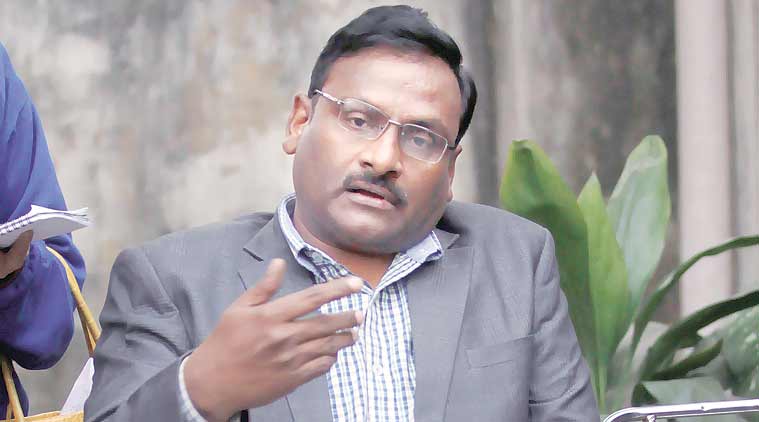Stay updated with the latest - Click here to follow us on Instagram
G N Saibaba bail: Are there rules to govern transfer of cases to principal Bench in Mumbai from other Benches, asks judge
Saibaba is being tried for his alleged links with Naxalites. He was arrested from Delhi last year by Gadchiroli police.
 Professor GN Saibaba
Professor GN Saibaba
Reportedly upset over the principal Bench of the Bombay High Court in Mumbai for taking it upon itself to adjudicate on the matter of bail of Delhi University professor G N Saibaba midway, Justice A B Chaudhari of the Nagpur Bench has posed some hard questions before the High Court administration. Chaudhari has questioned the”non-transparent” practice of shifting of cases from Nagpur and Aurangabad Benches to the principal Bench.
Terming it as “undermining” the authority of the judges of these Benches, the judge has asked in his order dated November 20, “Whether the transfer of cases from Benches of the Bombay High Court to the principal Bench in Mumbai, enabling the Hon’ble Chief Justice to act accordingly, are governed by any rules and regulations and whether the Hon’ble Chief Justice can order transfer of cases from a Bench or Benches to the principal Bench with or without any motion or without assigning any reason or without hearing the parties concerned or without knowing the views of the learned judge or judges from whose Bench the matter is proposed to be transferred?”
Saibaba was ordered to be released by the principle Bench, comprising Chief Justice Mohit Shah and Justice Sunil Shukre, on June 30, after a letter from social activist Purnima Upadhyay, narrating the plight of Saibaba as PIL.
Saibaba is being tried for his alleged links with Naxalites. He was arrested from Delhi last year by Gadchiroli police.
He was denied bail by the Nagpur Bench, comprising Sunil Shukre (subsequently shifted to Mumbai), earlier, on merit and after the Bench was satisfied about “proper medical care” being given to him at the Central Jail here.
The principal Bench, however, chose to release the 90 per cent handicapped activist on interim bail of three months. It was extended up to December 31. It had also directed Saibaba’s counsel to go back to the Nagpur Bench for regular bail.
Chaudhari, while hearing this regular bail plea, asked Saibaba’s counsel Rebecca John about the bail proceedings at the principal Bench. She replied that her client had not approached the principal Bench for bail on any ground. At the end of the hearing, Justice Chaudhari posted the matter for further hearing on December 11, but not before raising some grave concerns about the manner in which the matter had got shifted to the principal Bench, leading to an order that stood in sharp contrast against the one delivered by the Nagpur Bench.
“It is a known fact in the functioning of this High Court by virtue of the circular issued by the Hon’ble Chief Justice in 1992 that when the Registrar General of the High Court is made a party to a petition, even if the Bench at Nagpur or Aurangabad had jurisdiction, the same were to be automatically transferred to the principal Bench at Mumbai. It is also a known fact that when an application is made to the Hon’ble Chief Justice for consolidation of cases from the Benches i.e. principal Bench at Mumbai, Nagpur Bench and Aurangabad Bench in order to avoid any conflicting judgments, the transfers have been necessarily effected from those Benches for disposal at the principal seat at the Bombay High Court and not vice versa. This obviously gives a signal as if the Bench at Bombay alone is competent to decide the cases, rather than the Benches at Nagpur and Aurangabad, which thus stood trivialised. In no case, the principal Bench at Mumbai has hegemony over the Benches,” Justice Chaudhari has said in his order.
“Sometimes the matters from the Benches are transferred to the principal seat at Mumbai with or without any motion in a sudden move without recording any reasons or without any notice to any of the parties, much less, upon consultation with the presiding judge or judges of such a Bench from which the transfer of the cases is effected. This is undermining the authority of the judges at the Benches,” he has observed.
“It is thus seen that this hoary phenomena still continues to be in practice, and it must be described as ‘not transparent’. The worst sufferers in the process are the litigants from the backward regions of Vidarbha and Marathwada who are required to bear unnecessary burden of travel, accommodation and unaffordable, huge fees of advocates and their staff at Mumbai as compared to Nagpur and Aurangabad, apart from the serious inconvenience to them and the labyrinth of the legal system in which they are trapped, which is insidious for the institution,” he has added.
“Looking to the importance of the questions involved, this court expects the learned Advocate General of the State to address this court on the next date when the plea of applicant for bail will be positively considered,” said Justice Chaudhari.







